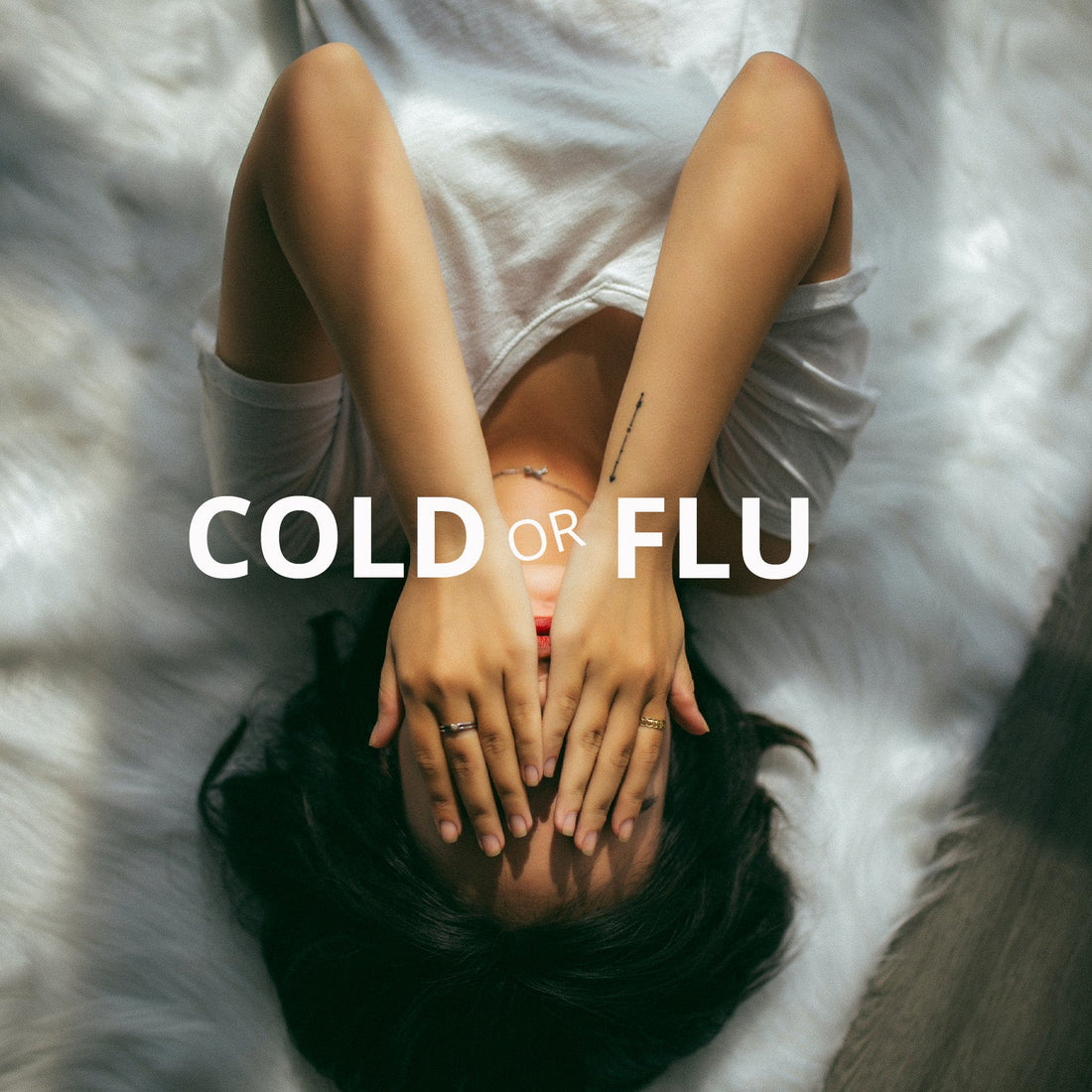Millions of cases of flu and billions of cases of colds are reported each year in the U.S. Cold and flu viruses are not the same, even though some of their symptoms overlap. Flu symptoms are more severe and can be life-threatening. The flu kills more than 30,000 people each year.
The Difference Between Colds and the Flu
Colds typically start with a burning feeling in the nose or throat and is followed by sneezing, a runny nose, and a feeling of being tired or just feeling under the weather. Symptoms can be felt about one-to-four days after catching a cold virus—this is the most contagious period so it’s best to stay home and avoid contact with others during this time.
You may get a mild cough, and your runny nose may become a thicker secretion that is slightly yellow or green. Your immune system is weaker when infected with this virus, which can increase your risk of bacterial superinfection of your sinuses, inner ear, or lung. If your symptoms have gotten worse, rather than better after three-to-seven days, you may have acquired a bacterial infection. You will usually not have a fever, which in fact, could point toward you having the flu rather than a cold.
The flu, also called influenza, is a super-contagious virus that makes you feel absolutely miserable. You will likely start feeling bad quickly, rather than over time. You may experience a high fever, headache, muscle aches, cough, sore throat, and fatigue. You may also have a runny or stuffy nose, chills, nausea, or vomiting.
Most symptoms get better after about five days but can sometimes last for a week or more. You may be relieved of your fever and aches, but still feel drained of energy for weeks. It’s typically more common in winter months, as more people spend time indoors and in close contact with each other, allowing the virus to spread more easily. This is true of colds as well.
What You Can Do to Help Your Body Recover Faster
Treatments like painkillers and cold and flu-specific over-the-counter medications can help ease your symptoms, but they won’t necessarily give your immune system a boost. The good news? You probably have a lot of these home remedies in your medicine cabinet already, and if not, they’re likely at a grocery store or pharmacy just down the street from you. There are also some key lifestyle and hygiene habits you can adopt that don’t cost you a thing!
Vitamins and Herbs
- Vitamin C – It’s very likely that you’ve been told to take this if you have a cold or are looking to prevent one. While there is limited research that supports it as a good preventative, studies do show that it is effective at reducing symptom severity and shortening colds or the flu. Foods high in vitamin C: Strawberries, broccoli, oranges, pineapple, and bell peppers. *Note: High doses can cause upset stomach and diarrhea in some people, so be sure to monitor your reactions and dosage.
- Echinacea – Evidence here is mixed, but some studies show it can reduce the length and severity of colds by 10-30%. Many experts are fairly sure echinacea can help treat colds. Some of the conflicting study results may be due to the testing of different species of echinacea. *Note: If you have allergies to ragweed or certain flowers in the daisy family, consult your doctor before taking echinacea.
- Elderberry – There is some promising evidence that elderberry can boost the production of some immune cells and may help block a virus’s ability to spread. One study found that taking four tablespoons per day for three days of Sambucol elderberry extract shortened flu symptoms by 56%. It also helped reduce other flu symptoms, like fever.
- Zinc – Zinc has the ability to stomp out sickness faster than your immune system would be able to do without it. It has a powerful impact on immune function and studies reveal that it can reduce the duration of symptoms associated with colds. Foods high in zinc: Legumes, seeds, yogurt, red meat, and seafood.
- Garlic – Garlic seems to stimulate the immune system and may also help fight viruses. There is some preliminary evidence that suggests garlic may lower your risk of catching a cold. It works best when consumed raw, crushed, diced, or minced. Overcooking garlic may destroy the important medicinal compounds and enzymes that make it effective. *Note: Garlic may be dangerous in people who are on blood thinners, consult your physician.
- Ginseng – Commonly used as a mild stimulant, the different species of ginseng may also offer a boost to the immune system and help prevent or treat colds and flu. One species, Panax ginseng, may also increase the protection offered by the flu vaccine.
- Vitamin D – Vitamin D has been proven to reduce the duration of the flu and other chronic viral infections. It is especially helpful in those who have low levels of vitamin D in the first place. It can work wonders for your immune system and can help bump up immunity to fight off infections. Foods high in vitamin D: Salmon, sardines, egg yolks, mushrooms, and fortified foods. *Note: It is most commonly obtained through sun exposure, so if you can, get outside in the sunshine!
- Vitamin B6 – This vitamin plays a major role in our bodies, is used for over 100 enzymatic reactions, and works closely with the immune system to ward off infections like the flu. It’s involved in brain development, nervous system functioning, and possibly slowing cognitive decline. A trademark sign of vitamin B6 deficiency is a weakened immune system and a decrease in the production of serum antibodies. Foods high in vitamin B6: Chickpeas, liver, tuna, salmon, chicken, and potatoes.
- Magnesium – Magnesium is involved in over 600 enzymatic reactions in the body, so this is not a mineral you want to be deficient in. It assists in bone formation, heart health, decreasing inflammation, relieving stress, and keeping the flu at bay. Magnesium plays a critical role in regulating the immune response. Foods high in magnesium: Spinach, pumpkin seeds, avocado, legumes, leafy greens, and dark chocolate.
Lifestyle and Hygiene Habits
- Eat healthy foods. Getting the essential vitamins and minerals mentioned above through food is the best way for absorption!
- Get regular exercise. Moderate exercise, when studied, has been found to increase white blood cell numbers—these guys help fight infection. Try to get in a brisk walk, some yoga, or resistance training. It doesn’t need to be super intense.
- Manage your stress levels. Chronic stress can have a negative impact on your immune system and physical health.
- Cover your mouth when you cough. Coughing allows the spreading of germs up to six feet, as most of us are familiar with by now. Make sure you cough into your sleeve instead of your hands to help reduce the risk of spreading your sickness.
- Wash your hands! This should be a mantra at this point. Wash with soap for a full two rounds of “Happy Birthday”—and don’t rush! If you lack access to soap and water, rub your hands together with an alcohol-based gel for 30 seconds.
- Flu vaccine. When it comes to preventing the flu, vaccination is seen as the gold standard. The CDC recommends it annually for those aged six months and older. Most of the time you can get access to one for no cost!
If you want to give your immunity a daily boost, try adding The Daily Hormone Balance to your routine! It has vitamin B6, magnesium, and zinc! It’s a great way to support your immune system while supporting your hormones simultaneously.
While some vitamins and herbs may help you fend off the common cold, vaccination has been deemed the best prevention for the flu. Taking a daily vitamin is also an excellent way to boost your immunity and supplement what you’re not getting from your diet. And if you do find yourself battling a cold or flu, try some of the vitamins and herbs we mentioned above to speed up your recovery time!


